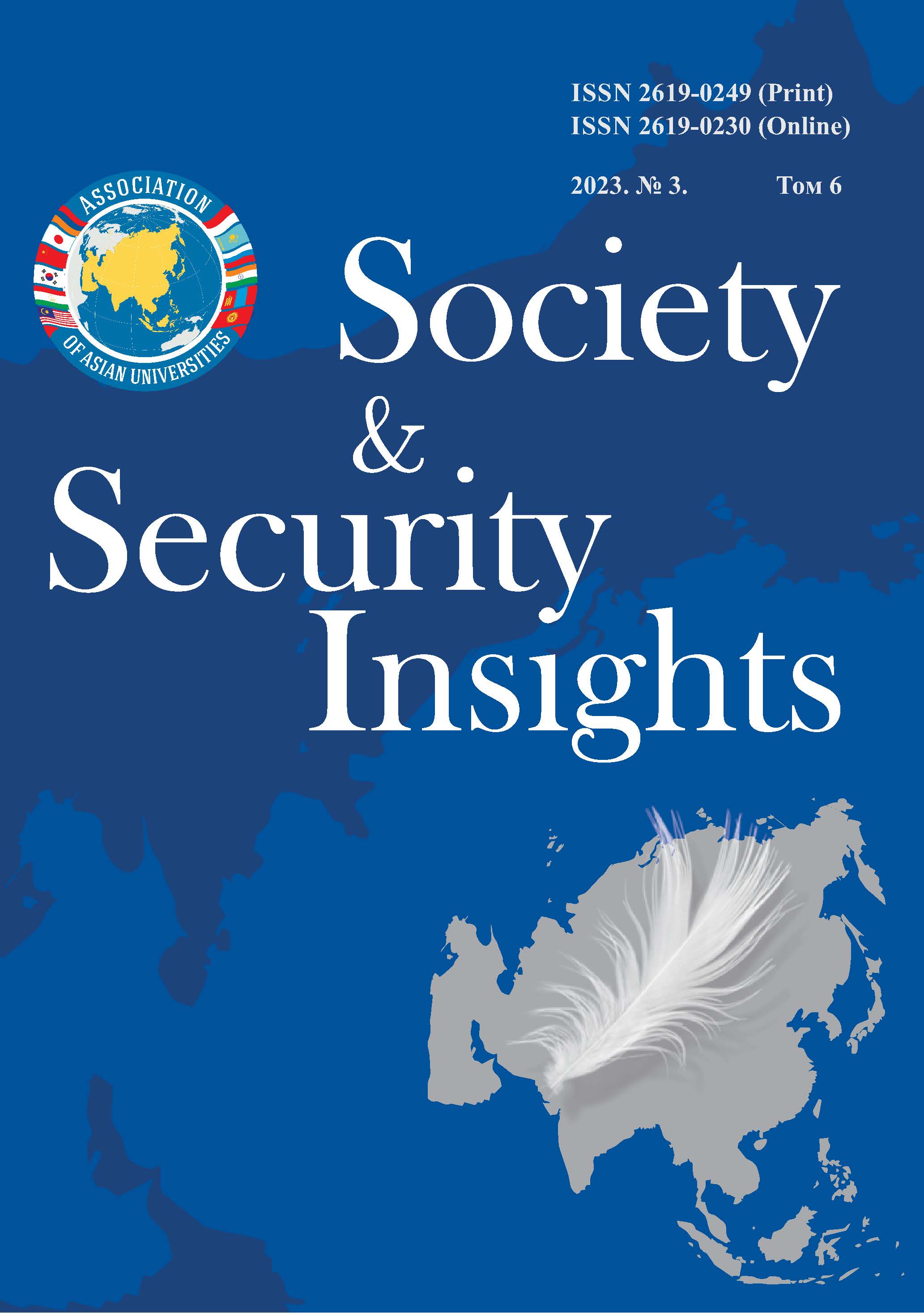MOTIVES FOR A SOBER LIFESTYLE AND MEASURES TO SPREAD IT: RESULTS OF A SOCIOLOGICAL STUDY
Main Article Content
Abstract
A factor in the health of the population is a sober lifestyle, free from addictive behavior. To assess the scale of addictions, their causes, ways to reduce the problem, a sociological survey of teachers from the Republic of Bashkortostan, who observe and fix the dynamics in the motives, roles and practices of a sober lifestyle. A sober lifestyle has become a social norm. Stressful situations, lack of support, dissatisfaction with life, difficult life situation, heredity and a tendency to addiction contribute to addictions. The main motives for choosing a sober healthy lifestyle are health as a value for a person, family traditions and education, sobriety as a principled position in life. Among the measures to expand the practice of a sober lifestyle, supplement anti-alcohol and anti-drug policies, are conditions for sports and other types of leisure creation, strengthen restrictive measures, promote healthy lifestyles, solve employment problems and improve the welfare of the population.
Downloads
Metrics
Article Details

This work is licensed under a Creative Commons Attribution 4.0 International License.
Authors retain the copyright of their manuscripts, and all Open Access articles are distributed under the terms of the Creative Commons Attribution License, which permits unrestricted use, distribution, and reproduction in any medium, provided that the original work is properly cited.
References
Белова Ю. Ю. Время больших возможностей, или Как миллениалы преодолевают зависимость от алкоголя: автобиографическое исследование // Вопросы наркологии. 2022. № 4–6. С. 116–130. doi: 10.47877/0234-0623_2022_4-5-6_116
Белова Ю. Ю. Модели социальной превенции алкоголизации населения в регионах России с различными климатическими условиями // Регионология. 2018. Т. 26, № 2. С. 314–337. doi: 10.15507/2413-1407.103.026.201802.314-337
Белова Ю. Ю. Трезвый образ жизни: мотивы, роли, практики. Социологические исследования. 2023. № 1. С. 82–94. doi: 10.31857/S013216250022133-9
Гапонова Е. А., Петрачков И. В., Гиноян А. Б., Улумбекова Г. Э. Опыт развитых стран в области антиалкогольной политики // Высшая школа организации и управления здравоохранением, 2020. 4 авг. URL: https://www.vshouz.ru/journal/2020-god/opyt-razvitykh-stran-v-oblasti-antialkogolnoy-politiki/
Жегусов Ю. И. Молодежь республики Саха (Якутия) и антиалкогольная политика // Теория и практика общественного развития. 2012. №5. С. 70–74.
Клюшникова Е. А. Новый концептуальный подход к пониманию трезвости в рамках теории динамических информационных систем // Непрерывное образование: XXI век. 2021. № 4. URL: https://lll21.petrsu.ru/journal/article.php?id=7167. doi: 10.15393/j5.art.2021.7167
Москаленко В. Д. Взрослые дети больных зависимостями — группа множественного риска // Наркология. 2009. Т. 8, № 2. С. 76–84.
Одинокова В. А. Социальные предпосылки проблемной алкоголизации в современной России: автореф. дис. … канд. соц. наук. СПб, 2016.
Познякова М. Е., Брюно В. В. Изменение отношения населения к спиртному как фактор дестабилизации алкогольной ситуации в стране // Алкоголь в России: материалы Восьмой науч. конф. Иваново, 2018. С. 30–39.
Столь А. В. Оценка состояния здоровья населения Республики Башкортостан как показатель качества жизни в регионе // Молодежный научный форум «Уфимский гуманитарный научный форум». Уфа : Институт стратегических исследований Республики Башкортостан, 2022. С. 393–397.
REFERENCES
Bajkova, M.A., Merinov, A.V. (2018). The influence of parental alcoholism on suicidological and personal-psychological characteristics of offspring. Rossijskij mediko-biologicheskij vestnik im. akademika I.P. Pavlova, 26(4), 547-558. https://doi.org/ 10.23888/PAVLOVJ2018264547-558 (In Russ.).
Belova, Yu.Yu. (2022). A time of great opportunity, or How millennials overcome alcohol addiction: an autobiographical study. Voprosy narkologii, 210(4-5-6), 116–130 https://doi.org/10.47877/0234-0623_2022_4-5-6_116 (In Russ.).
Belova, Yu.Yu. (2018) Models of social prevention of alcoholization of the population in regions of Russia with different climatic conditions. Regionologia, 26(2), 314-337. https://doi.org/10.15507/2413-1407.103.026.201802.314-337 (in Russ.)
Belova, Yu.Yu. (2023). Sober lifestyle: motives, roles, practices. Sociologicheskie issledovanija, 1, 82-94. https://doi.org/10.31857/S013216250022133-9 (In Russ.).
Gaponova. E.A., Petrachkov. I.V., Ginojan A.B., Ulumbekova. G.Je. (2018). Experience of developed countries in the field of anti-alcohol policy. Vysshaja shkola organizacii i upravlenija zdravoohraneniem, 4 August, URL: https://www.vshouz.ru/journal/2020-god/opyt-razvitykh-stran-v-oblasti-antialkogolnoy-politiki/
Zhegusov, Ju. I. (2012). Youth of the Republic of Sakha (Yakutia) and anti-alcohol policy. Teorija i praktika obshhestvennogo razvitija, 5, 70-74 (In Russ.).
Kljushnikova, E.A. (2021). A new conceptual approach to understanding sobriety within the framework of the theory of dynamic information systems. Nepreryvnoe obrazovanie: XXI vek, 4 (36). URL: https://lll21.petrsu.ru/journal/article.php?id=7167. https://doi.org/10.15393/j5.art.2021.7167 (In Russ.)
Moskalenko, V.D. (2009). Adult children of addicts are a multiple risk group. Narkologija, 8(2), 76-84 (In Russ.)
Odinokova, V.A. (2016). Social prerequisites for problematic alcoholism in modern Russia: synopsis of thesis, Saint-Petersburg (In Russ.).
Poznjakova, M.E., Brjuno, V.V. (2018). Changing the population's attitude towards alcohol as a factor in destabilizing the alcohol situation in the country: Alcohol in Russia. Materialy vos'moj nauchnoj konferencii, Ivanovo, 27-28 oktjabrja 2017 g. Ivanovo, 30-39.
Stol', A.V. (2022). Assessment of the health status of the population of the Republic of Bashkortostan as an indicator of quality of life in the region: Youth scientific forum “Ufa Humanitarian Scientific Forum”. Ufa: Institut strategicheskih issledovanij Respubliki Bashkortostan, 393-397.


 https://orcid.org/0000-0002-9528-2893
https://orcid.org/0000-0002-9528-2893